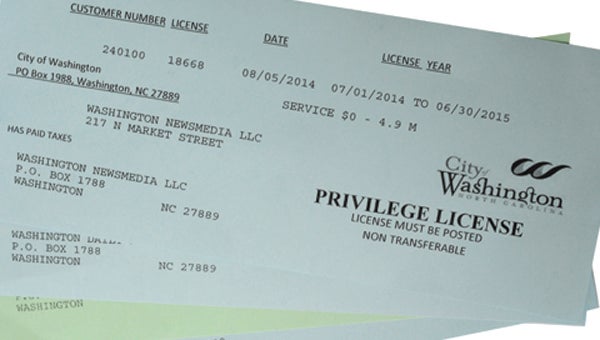Municipalities seeking revenue-source options
Published 5:21 pm Monday, June 15, 2015

LOST REVENUE: Municipalities in North Carolina face the challenge of finding revenue to replace revenue generated by the issuance of business privilege licenses. A law that takes effect July 1 removes the authority of cities, towns and villages to issue such licenses. The state’s municipalities will lose at least $62 million (combined) annually in revenue once generated by issuance of the licenses.
Flexibility.
That’s the byword municipal officials repeated during a meeting concerning the future of the state’s cities, towns and villages when it comes to their finances, especially revenue sources. That needed flexibility will have to come from the N.C. General Assembly, according to those same officials.
The officials were part of a meeting held in Greenville on Monday to discuss municipal finances. The meeting, A Path Forward: Vibrant Cities Today and Tomorrow, was designed to look at the many financial challenges facing the state’s municipalities, from big cities such as Charlotte to small towns such as Aurora, Chocowinity and Belhaven. It was presented by the N.C. League of Municipalities.
“The first I gathered was that I think it’s going to be imperative for local government to come up with some type of system to introduce to our elected officials in the General Assembly about how we can replace the revenues that we are being shortchanged with because of the past legislation, specifically the business privilege license and the re-allocation of the sales tax (revenues),” said Bobby Roberson, Washington’s interim city manager and who attended the meeting. “I think it’s imperative for us to work toward having municipalities doing their own sales tax system without being encumbered by the county.”
A panel of municipal officials — Havelock Mayor Will Lewis, Edenton Town Manager Anne-Marie Knighton and Rocky Mount Councilman Lamont Wiggins — said there’s no doubt the state’s municipalities need additional revenue sources in the wake of General Assembly actions taking away revenue sources from them.
As of July 1, the state’s cities, towns and villages lose the authority to generate revenue by issuing business privilege licenses. NCLM’s Chris Nida, the organization’s director of research and policy analysis, said the Legislature’s move to remove that authority would cost the state’s municipalities a combined $62 million in revenue. Many municipalities are increasing taxes, cutting services or both to offset that loss of revenue, he said.
Washington will lose about $120,000 business privilege license revenue annually when the new fiscal year begins July 1.
While business owners across the state won’t pay for business privilege licenses after July 1, some of those business owners — if they are property owners, too —could see their property taxes increase to replace the revenue lost by a municipality because it can no longer issue such licenses.
Wiggins wants municipalities to lobby the Legislature for a quarter-cent sales tax option that would allow a city, town or village to use revenues generated by the local sales tax exclusively for city purposes. Lewis and Knighton support that initiative.
A bill in the Legislature would allow a county the authority, by referendum, to levy an additional half-cent local sales tax, but revenue generated by the increase would not be shared with a county’s municipalities. The bill also caps any local sales tax at 2.5 cents.
Panel members said the Legislature’s one-size-fits-all approach to municipal finances does not work and needs to be scrapped in favor of a system that acknowledges some municipalities have needs and issues that others do not have. Municipal leaders and the Legislature must work together to find options other than the one-size-fits-all option, panel members said.
Knighton said municipalities would need other revenue sources or face the possibility of increasing property taxes, which after July 1 will be the only revenue source over which municipalities have direct control, cutting services or both.
Lewis said Havelock’s budget for the upcoming fiscal year includes a tax increase, in part, to cover the loss of revenue generated by the issuance of business privilege licenses in past years.
“We have so little wiggle room” for revenue sources under current state law, said Lewis, who would like to see the Legislature provide municipalities more options when it comes to generating revenues.
For additional coverage of the meeting, including changes in how revenue generated by sales taxes is distributed, see future editions of the Washington Daily News.





